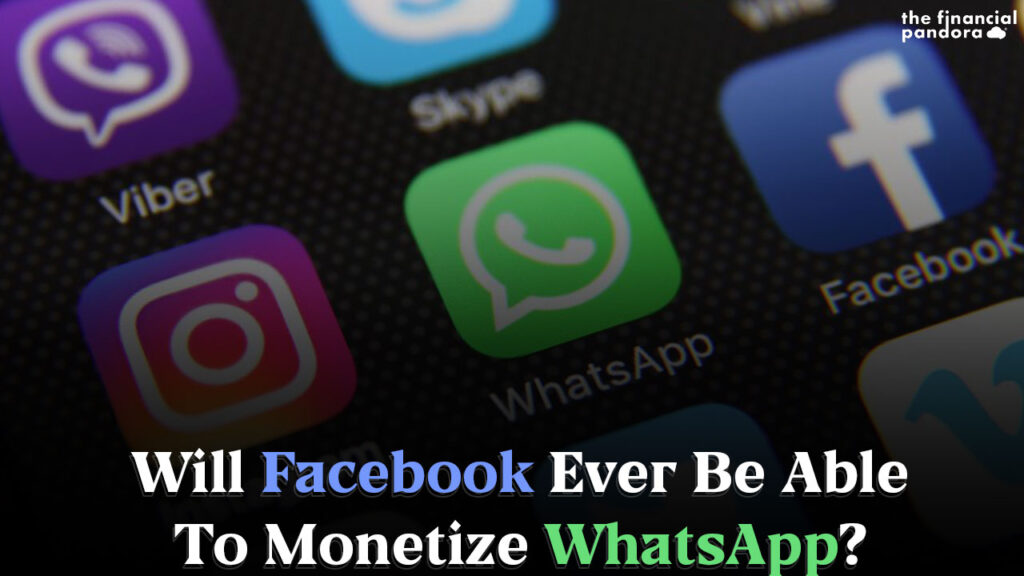In February 2014, the social media giant Facebook acquired WhatsApp, a free cross-platform messaging that rivaled Facebook’s own messaging platform ‘Facebook Messenger’ for a staggering USD 19 billion. The app’s operations were to be independently managed until Facebook had plans to gradually integrate WhatsApp’s services with itself and eventually find new ways to monetize it, considering it spent more than Iceland’s GDP in 2014 to acquire it.
On January 18th, 2016, WhatsApp announced that it would be no longer charging users 1 dollar annual fee, which rapidly accelerated the user growth at the cost of stripping its app revenue completely. Particularly in India, it has over 400 million users being the most significant market, with overall users reaching over 2 billion! Despite growing its user base exponentially, Facebook has yet to monetize WhatsApp.
Facebook heavily advertises itself as a ‘social media’ platform to ‘connect everyone’, but the reality is that around 98% of its revenue comes from advertising, making it the world’s biggest publisher.
So, why hasn’t WhatsApp hasn’t been monetized yet, even after successfully converting Instagram to an ad-based revenue stream?
A couple of years ago, Facebook announced the plan to present ads in the ‘status’ section of WhatsApp. It caused a mini-revolt among the leadership, which feared that the app would become yet another advertising billboard. Facebook has removed the code that enabled ad support and disbanded the team that was developing the feature.
There are not many options available for a company to monetize its app, especially if it is being rivaled by countless apps that do not have any motives to make money.
Let us discuss the options available to Facebook to make money from WhatsApp and what opportunities and problems it might face in implementing that scheme:
1. Charge per download/ Subscription fee:
This option may only have theoretical relevance as Facebook, after acquiring WhatsApp, announced the retraction of the 1 dollar per year fee that the app charged its users to generate revenue. Reinstating the previous policy or demanding users on a subscription basis may divert the enormous market that it has captured to another app like Telegram or Signal.
2. Converting it to an ad-based platform:
If past is any indication, WhatsApp would have similar troubles implementing this route to revenue. Facebook itself is under heavy vigilance of the United States Congress for its alleged malpractices in advertisement business and having undue influence to affect the country’s election. US Federal Trade Commission (FTC) and 46 other states have bought anti-trust cases against Facebook. Mark Zuckerberg certainly wouldn’t want to go through the same circle of vigilance all over again for WhatsApp.
The recent changes that Facebook made in privacy terms, which allowed WhatsApp to share information like contacts and profile data, sparked a lot of debate and controversies and required all those who disagreed with the terms to delete their accounts mandatorily has led many people to uninstall WhatsApp and shifting to other apps like Signal even after end-to-end encrypted chats and video and voice calls being introduced a while ago. It also added a biometric security layer for the desktop version of the app for linking accounts. This mayhem was followed by an announcement of the postponement of the implementation of the terms by Facebook.
3. Becoming a money transfer service:
This is a promising territory to test waters as it already has enough market base and correct demographics for succeeding in this segment as these new messaging apps blending peer-to-peer payments as a feature can flourish where much of the population is unbanked or under-banked as seen in China with apps like Tencent’s WeChat.
In November 2020, WhatsApp finally launched the long-awaited payments feature for 20 million users, initially following the pilot test in 2018. Although, WhatsApp is not alone in this space. It faces cut-throat competition from Google Pay, Paytm, and Phone Pe.
WhatsApp has had a relatively slow start recording only 310,000 transactions in its initial 30 days of launch. It may also face regulatory hurdles as the National Payments Corporation of India (NCPI) may bring a 30% cap on total Unified Payments Interface (UPI) transactions carried out to avoid any monopolies.
All in all, the best bet for WhatsApp at this time seems to be to move towards money transfer service as a large portion of its user base (India being largest with around 400 million users and Brazil being second largest with over 120 million users) is in developing countries where such blended apps have tremendous potential for growth. Though, only time will tell how well it can survive in an already tight market.
This post was written in collaboration with Asif Yahiya Sukri LLP. Asif Yahiya Sukri LLP provides unparalleled personalized financial services to a broad range of clients across different geographical locations. With a presence in the USA, India and the MENA region, they ensure that all of your financial decisions are made carefully and with your best interests in mind. They are innovators who understand what goes into building companies.
You can also reach out to them on info@aysasia.com
Follow Us @




